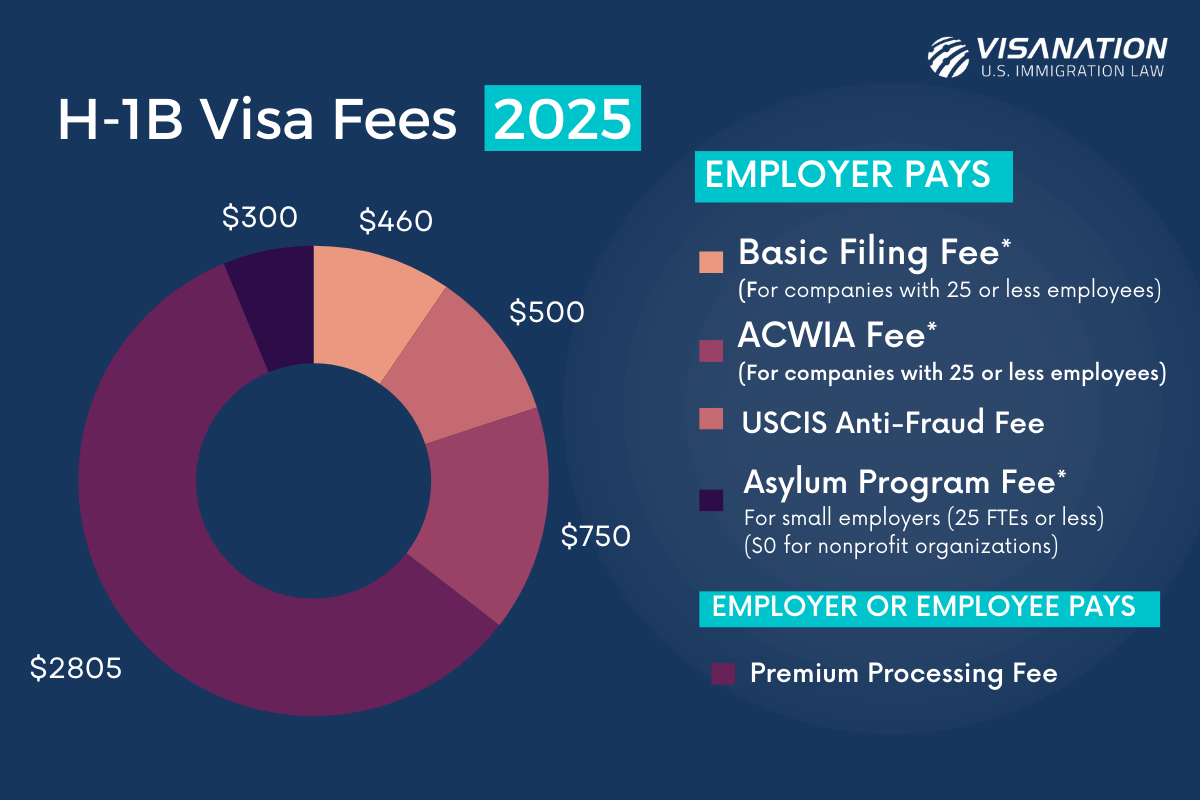To save time and money, it’s vital to have a clear understanding of the H-1B visa fees. Avoiding common errors requires a thorough understanding of the applicable fees, how to pay them, and who is responsible for paying each. Whether you’re applying for the H-1B visa in the upcoming visa lottery cap or applying with a cap-exempt organization, or looking for an extension or transfer, understanding the costs associated is key.
Have questions about H-1B visa fees? Speak with an immigration expert today
H-1B Visa Fees
The H-1B visa cost will depend on many variables, like optional fees, company size, attorney fees, and employment criteria. With that said, it’s still necessary for all parties to be completely aware of the H-1B filing fees charged. Therefore, we strongly recommend having VisaNation Law Group conduct a thorough case evaluation before entering the H-1B visa lottery to ensure you meet the wage eligibility requirements, attract eligible candidates, and submit your registration correctly.

Detailed H-1B Fee Breakdown
If you’re planning to apply for an H-1B visa, it’s important to understand the breakdown of fees associated with the application process. This will help you plan your budget accordingly and avoid any surprises along the way.
|
Fee |
Amount |
Responsible for Fee |
|
H-1B Proclamation |
$100,000, in specific cases |
Employer |
|
Lottery Registration Fee |
$215 |
Employer |
|
I-129 Petition Filing Fee |
$780 $460 (small employers/nonprofits) |
Employer |
|
Public Law 114-113 Fee |
$4,000 (only if 50+ employees) |
Employer |
|
Premium Processing (optional) |
$2,805 |
Employer or Employee |
|
USCIS Anti-Fraud Fee |
$750 (less than 25 employees) $1,500 (more than 25 employees) |
Employer |
|
ACWIA Education and Training Fee |
$500 |
Employer |
|
Asylum Program Fee |
$600 (if 26+ employees) |
Employer |
|
Attorney Fee |
Variable |
Employer |
H-1B Visa Fees Paid by Employer
The costs of H-1B sponsorship for employers include:
- Breaking: Trump has signed a new proclamation introducing a $100,000 fee to new H-1B petitions. The new $100,000 fee applies only to new H-1B petitions filed on or after September 21, 2025, primarily affecting employers sponsoring first-time H-1B workers. Existing H-1B holders seeking extensions with the same employer are not subject to the fee.
- Registration fee: $215
- Filing Fee: The standard H-1B filing fee is $780 for the I-129 petition
- The filing fee is $460 for small employers and nonprofits.
- American Competitiveness and Workforce Improvement Act (ACWIA) Training Fee:
- For employers who have 1-25 full-time workers, the fee is $750.
- For employers with 26 or more full-time employees, the fee is $1,500.
- Some organizations are exempt including, higher education institutions, nonprofits affiliated with higher education institutions, nonprofit or governmental research organizations, primary or secondary schools, and nonprofits with established curriculum-related clinical training programs.
- Fraud Prevention and Detection Fee: This $500 fee applies to new H-1B petitioners or those changing employers.
- Public Law 114-113 Fee: This H-1B fee applies to companies with more than 50 employees with over half on H-1B or L-1 status. The fee for these companies is $4,000. However, USCIS may exempt this fee.
- Asylum Program Fee: A fee that will be assessed on all Form I-129 and I-140 petitions to help cover the costs of asylum adjudications. This fee should also help free up SCOPS and FOD resources that have been diverted from EB adjudications to asylum adjudications.
- $600 for employers with 26 or more Full-Time Employees (FTEs)
- $300 for small employers (25 FTEs or less)
- $0 for nonprofit organizations
- Premium Processing (Optional): This service is available to expedite the H-1B visa process in a 15-day time frame for $2,805. To use this feature, you must complete Form I-907.
H-1B Visa Fees Paid by Employee
The optional fees of H-1B sponsorship for employees include:
- Premium Processing (Optional): This service is available to employers or employees who want to expedite the H-1B visa process in a 15-day time frame for $2,805. For employees, this fee is paid when personal reasons necessitate processing times to be reduced.
- H-4 Dependent Fee (Optional): Another optional expense is if family members apply to be H-4 dependents of the applicant by filling out Form DS-160. The legal fee is $850 and the filing fee is $470.
*If USCIS confirms your registration has been selected in the cap lottery, VisaNation attorneys can begin filing your petition for a separate legal fee of $2,600.
Attorney Fees
H-1B attorney fees differ tremendously depending on the firm. Since the stages are now tiered, only certain companies will eventually file the complete petitions. VisaNation Law Group’s legal fees are tiered as follows:
- Stage One: $300 for the initial registration process, which includes all required preliminary case analyses.
- Stage Two: $2,600 will be due if the case is selected in the lottery for filing, including all form/support letter preparation plus case filing within the timeframe.
- If applicable: $500–$1,600 will be the cost of a Request For Evidence (RFE) response, should one later be issued on the case.
If you are interested in registering for the 2026-27 H-1B visa lottery, contact VisaNation attorneys for submitting your registration.
Real H-1B Fee Example Cases:
Example A (25 or fewer employees):
A for-profit technology firm XYZ, has 20 employees and 10% of their employees are using the H-1B visa. If they file for an H-1B visa with premium processing then they need to pay the $2,805 fee, the base filing fee of $460, ACWIA fee of $750, anti-fraud fee of $500, and a $300 asylum fee. Technology firm XYZ would pay $4,815 for an H-1B petition aside from any attorney fees.
Example B (25+ employees):
A medical consulting firm BAC has 240 employees and 40% of their employees are employed using an H-1B visa. If they want to file for the H-1B visa with premium processing then they need to pay the $2,805 fee, the base filing fee of $780, ACWIA fee of $1,500, anti-fraud fee of $500, and a $600 asylum fee. The medical consulting firm BAC would anticipate paying $6,185 for an H-1B petition excluding attorney fees.
Example C (50+ employees on an H-1B Visa)
An engineering company EFG has 1,000 employees and 60% of their employees are employed using an H-1B visa. If they want to file for the H-1B visa with premium processing then they need to pay the $2,805 fee, the base filing fee of $780, ACWIA fee of $1,500, anti-fraud fee of $500, a $600 asylum fee, and a $4,000 Public Law 114-113 Fee. The engineering firm EFG would anticipate paying $10,185 for an H-1B petition excluding attorney fees.
How To Get a USCIS Refund for the H-1B Visa Cost
Usually, the USCIS keeps the filing fees even if they deny your petition. However, there is an H-1B processing fee refund for the H-1B visa cost for all petitions not selected in the annual lottery. Other circumstances for a fee refund include if:
- USCIS requested a form that was not necessary and asked for a fee
- The amount requested was more than the appropriate amount
- The USCIS fails to adjudicate a petition that you filed with an H-1B premium processing fee in 15 calendar days
H-1B Transfer Fee
When transferring an H-1B to a new employer, the following fees apply:
Form I-129 Filing Fee:
- $780 for most employers
- $460 for small employers (≤25 employees) & nonprofits
Fraud Prevention and Detection Fee: $500
- Paid only once per beneficiary per employer
- Required for new employers but not for extensions with the same employer
ACWIA (Training) Fee:
- $750 for small employers (≤25 employees)
- $1,500 for large employers (26+ employees)
- Exemptions: Certain nonprofits, educational institutions, and government research organizations
Public Law 114-113 Fee: $4,000
- Only for employers with 50+ employees in the U.S.
- More than 50% of the workforce must be on H-1B or L-1 visas for this to apply
Asylum Program Fee: $600
- Asylum fees are reduced to $300 for small employers
- The fee is reduced to $0 for nonprofits.
Premium Processing Fee (Optional): $2,805
- Guarantees USCIS response within 15 business days
Total H-1B Transfer Cost
- Minimum: $2,010 (for small nonprofits with no premium processing)
- Maximum: $10,185 (if all fees apply + premium processing)
Find out more about H-1B Cap Exempt Visas
Real H-1B Transfer Fee Example Case
John, an existing H-1B employee, would like to switch his employer via an H-1B transfer. His new employer, Company Zebra, is a large corporation with 5,000 employees, with less than half of all employees on H-1B Visas H-1B or L-1 visas. Company Zebra will be required to pay: The basic filing fee of $780 for bigger companies, the Fraud Detection and Prevention fee of $500, and the ACWIA fee for a company of this size would be $1,500. The total is $2,780
H-1B Extension Fee
The base filing costs for an H-1B extension include:
- Base filing fee (Form I-129): $780 for paper filing or $730 online
- The fee is reduced to $460 for small employers and nonprofits
Additional fees include:
- Asylum Program Fee: $600
- Asylum fees are reduced to $300 for small employers and $0 for nonprofits.
- ACWIA Fee
- Less than 25 full-time employees: $750
- (25 or more full-time employees): $1,500
- Exclusions for eligible organizations: Higher education institutions, nonprofits affiliated with higher education institutions, nonprofit or governmental research organizations, primary or secondary schools, and nonprofits with established curriculum-related clinical training programs
- Exclusions for second extensions: applies to petitioners who file a second request for an extension with the same employer for a foreign worker.
- Optional: Premium Processing fee of $2,805
Small vs Large Employer Fee Scenarios for Standard H-1B Extension
Small employer (25 or fewer full-time employees):
- Form I-129 filing fee: $460
- ACWIA fee: $750
- Asylum Program Fee: $300
- Total: $1,510
Large employer (25+ full-time equivalent employees):
- Form I-129 filing fee: $780
- ACWIA fee: $1,500
- Asylum Program Fee: $600
- Total: $2,880
*Note: We do not take any responsibility for the accuracy of the information posted on external websites.
If you are interested in registering for the 2026-27 H-1B visa lottery, contact VisaNation attorneys for submitting your registration.
Frequently Asked H-1B Fees Questions
Below, you will find answers to the most commonly asked questions:
Do I have to pay H-1B fees with the registration process?
Sponsors will be responsible for the non-refundable $215 registration fee for entering a beneficiary into the cap. However, you will have to pay all applicable H-1B fees if selected for the cap.
Who pays H-1B visa fees?
The sponsor (employer) pays the H-1 B visa fees for the beneficiary’s (employee) H-1B petition.
Who pays the attorney fees?
Typically the employer will cover the registration costs of the beneficiary. However, if the beneficiary would like to add a dependent to the filing, then that cost is covered by the beneficiary.
Will USCIS suspend premium processing again, and what is the H-1B premium processing fee?
In the past, USCIS suspended premium processing. However, it is still available for this filing season for a H-1B premium processing fee of $2,805.
What is the LCA Filing Fee?
The Labor Condition Application (LCA), required for all H-1B visas, does not have a requisite fee attached to it, similar to the PERM Labor Certification. Your employer must simply make the four attestations required by the Department of Labor (DOL). If you decide to hire an immigration attorney to help you get the LCA, then that would be the only fee for this form. However, there have been LCA delays when the iCert visa portal doesn’t recognize the employer or company’s FEIN Number. Typically, this happens because there hasn’t been a pre-verification before the LCA was submitted.
What is the fraud prevention and detection fee?
This fee is meant to ensure that there is only one filing between the beneficiary and petitioner to avoid any fraud in the H-1B program.
What happens after receiving a selection notice?
Form I-797C, Notice of Action is issued by USCIS to communicate information pertaining to receipt, rejection, transfer, reopening or an upcoming appointment should you be selected in the lottery.
Is there a salary requirement for the H-1B?
There is no minimum salary that you must have to qualify for an H-1B visa. You must have at least a bachelor’s degree and a job offer from a U.S. employer that requires your degree. However, the current administration intends to implement changes to the H-1B visa requirements, including a minimum salary.
What are the H-1B visa fees for India?
The same fees outlined above apply to nationals of India as well as applicants from other countries. Again, some fees may fluctuate depending on the size of the company and whether you opt for premium processing or not.
How can USCIS exempt certain fees?
Depending on the amount of employees employed on an H-1B and L-1 visa within a company, they may not have to pay the Public Law 114-113 fee if they have less than 50 employees.
Can an employer in the U.S. require a foreign employee to pay for the H-1B fees?
No, it is against U.S. legal regulations if they do so. However, be aware that site audits are common, and auditors will confirm that the employer paid their responsible fees.
Employers must pay for all H-1B fees. The only exceptions where the beneficiary can pay for fees are premium processing fees and visa fees for consular processing. Premium processing is an optional fee.
What happens after receiving a selection notice?
After receiving a selection notice, you have 90 days to file the complete H-1B cap petition. Your selection notice will indicate your filing window. Be sure to work with your immigration lawyer on this to meet all the registration requirements, pay the required fees, and submit the proper documentation.










